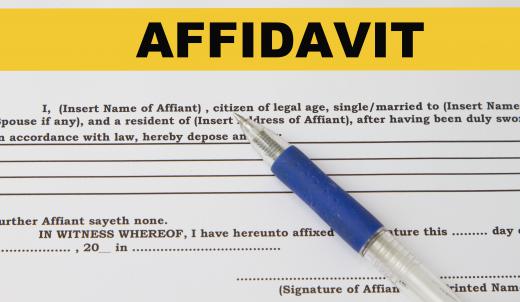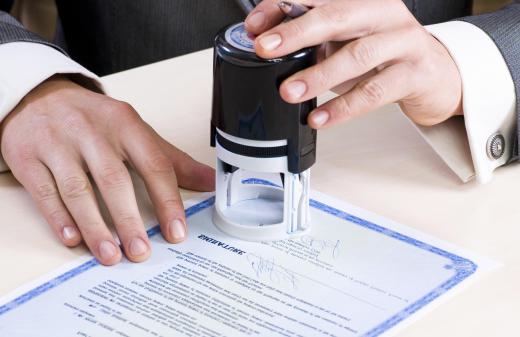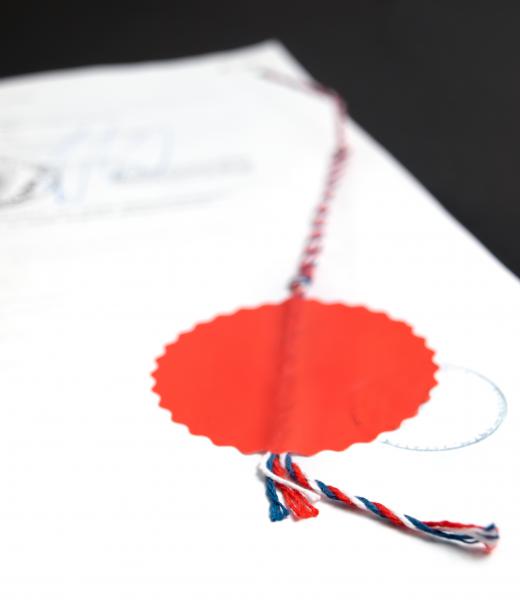At MyLawQuestions, we're committed to delivering accurate, trustworthy information. Our expert-authored content is rigorously fact-checked and sourced from credible authorities. Discover how we uphold the highest standards in providing you with reliable knowledge.
What Is a Sworn Affidavit?
A sworn affidavit is a written statement made by a person who is under oath to tell the truth about the facts and information contained in the statement. Additionally, the person signing the affidavit, called the affiant, attests to his or her identity. Usually, the statement must be witnessed and signed by a person who is legally authorized to administer oaths, such as a notary public. The notary is generally required to place a notary seal on the document.
When a person signs the affidavit, he or she is promising that anything contained in the statement is accurate and true. Effectively, it is the same thing as orally presenting testimony in court. If a person lies about the information contained in the statement, he or she could be prosecuted for the crime of perjury, which is lying under oath. Someone who is convicted of perjury may be ordered to pay significant fines or may even be sentenced to time in jail.

A sworn affidavit is most commonly used in a court case for the purpose of providing evidence about facts pertaining to the case. It may also be used to validate documentary evidence, such as an official record. In some circumstances, an affidavit is entered into evidence at a court trial in place of the affiant’s sworn testimony. This is typically done when the person is unavailable to come to court for some reason or when needed in order to save time. When an attorney files a motion or pleading on behalf of his or her client, the attorney may also submit affidavits for the purpose of establishing facts and lending credibility to the legal arguments made in the filing.

A person may sign an affidavit for events that occur outside of a court. For instance, the seller of a piece of real estate is generally required to submit an affidavit of title to the prospective homebuyer. The document usually states the seller’s marital status and certifies that there is no defect in the title. In addition, it may indicate that the seller is currently in possession or the property.

Some commercial circumstances may also require a sworn affidavit. For example, a business may use one to attest to its financial stability. When a person submits a credit application to a bank or other lending institution, he or she is often required to sign a document confirming his or her financial status. In the context of probate, affidavits may also be used to prove the validity of a deceased person’s will.
Frequently Asked Questions
What exactly do we mean when we refer to a "affidavit under oath"?

A written declaration that is considered to be a sworn affidavit is one that has been signed under oath and attested by a notary public or another authorized person. An affidavit is a written statement that can be filed as evidence in a court of law. A written record of a witness's or defendant's testimony or declaration of the facts is referred to as a sworn statement or deposition.
Why would you need to submit a signed affidavit?
An affidavit that has been sworn to under oath can be put to use in a number of different kinds of legal proceedings, such as when a divorce is being finalized, when a legal claim is being supported, when validating income in order to qualify for a loan, or when verifying a person's identification. Within the framework of a criminal procedure, it may be put to use to produce evidence or establish a search warrant.
Which details must be provided in an affidavit?
A sworn affidavit must contain the signer's name and address, as well as a statement of facts and a declaration that the statement is correct to the best of the signer's knowledge. In addition, the affidavit must contain a declaration that the affiant has taken an oath to support its contents. Also, the affidavit must bear the date and signature of the affiant, as well as the signature and seal of the notary or other authorized authority.
What does it imply when an affidavit must be sworn before it can be considered valid?
In the context of a sworn affidavit, taking an oath indicates that the affiant is aware of the significance of the declaration and is willing to face legal ramifications if the statement is found to be false. This helps ensure that the information supplied in the affidavit is believable and correct.
May a court challenge a sworn affidavit?
A court has the authority to throw out an affidavit in its entirety if it has reasonable grounds to suspect that the information included within it is false or intended to mislead the court. Due to the fact that a sworn affidavit is issued under oath, any false assertions that are included in the affidavit could result in significant legal penalties for the person who filed the affidavit.
AS FEATURED ON:
AS FEATURED ON:














Discussion Comments
I think it's great that this kind of testimony is allowed in courts. There are circumstances where a person with important information simply can't go to the court in person. Or there are situations where if the person did have to travel to the court, it could result in negative circumstances in his or her personal life.
I'm happy to know that the people who are needed to testify for court cases are given this kind of protection.
I am always nervous about signing forms that promise I have stated everything accurately and to the best of my ability. I'm always worried that I've made some sort of mistake somewhere.
What would happen if you honestly made a mistake on an affidavit form? What if you misunderstood something, or made some other kind of error? Could you still be facing jail time?
Post your comments